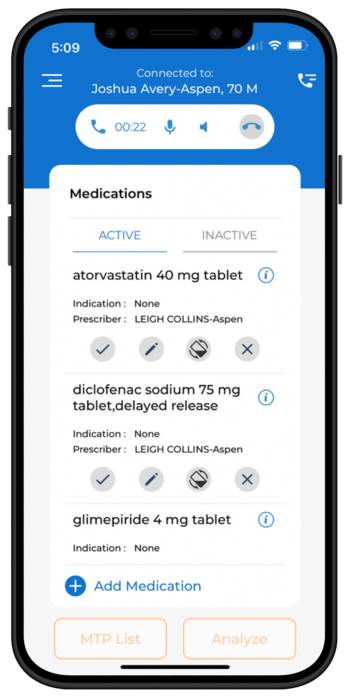Medication adherence is essential for managing chronic conditions, improving patient outcomes, and reducing healthcare costs. Yet, millions of patients fail to take their medications as prescribed, leading to preventable hospitalizations and poor health outcomes. Aspen RxHealth partners with health plans to provide a pharmacist-led solution that drives better medication adherence through personalized patient engagement, proactive interventions, and real-time insights.

Keeping chronic conditions in check requires consistent medication adherence. Our clinical pharmacists use predictive models and patient engagement strategies through our web platform, BeWell, to ensure members managing conditions such as diabetes, hypertension, and high cholesterol remain on track with their treatment plans.


Medication adherence is critical to managing chronic conditions, reducing hospitalizations, and improving overall health outcomes. Aspen RxHealth provides a pharmacist-led, data-driven approach to ensure members stay on track with their medications, improving Star Ratings and reducing costs for health plans.
Our elastic workforce model enables us to design and implement these condition management and medication adherence programs faster and more efficiently than the competition. In fact, we’re providing our clients 30% greater efficiency than traditional vendors while maintaining a CMS compliance rate of over 99%
Effective adherence management requires meaningful engagement and expert guidance. Aspen RxHealth is transforming medication adherence through technology, clinical expertise, and pharmacist-led care.
Schedule a demo with us today and learn how we can help optimize your adherence programs and improve member health.
Medication adherence is when a patient fills and uses their prescriptions according to the directions given by the prescriber. Education is a critical part of medication adherence, to ensure that patients understand the risks of nonadherence, and the benefits of taking their medications as directed.
The best way to improve medication adherence is through patient education. When patients don’t understand how their medications work or why they were prescribed in the first place, they are more likely to become nonadherent. However, when they have a strong understanding of their medication regimen and how important it is for managing their health, they are likely to remain adherent.
Medication adherence is important for one simple reason—medications don’t work if they aren’t taken properly. Especially in patients taking multiple medications to manage one or more conditions, it’s critical that all medications work in harmony with each other in a consistent manner.
As healthcare’s foremost medication experts, pharmacists are highly qualified to help patients with medication adherence related issues. Pharmacists can use their extensive knowledge and expertise to educate patients about why adherence is important and the risks of falling out of adherence. During a patient conversation, pharmacists can also detect medication issues and work with the prescribing physician to correct them, subsequently improving adherence.
The most common way to measure medication adherence is through proportion of days covered, or PDC. PDC estimates medication adherence by calculating the percentage of days in which a patient has access to their medication during a given period of time. This method is used because prescription drug claims can be analyzed to determine how much of a medication was dispensed, however, through pharmacist-led consultations, greater accuracy of medication adherence can be determined, as access to medication does not equate to patient adherence.
